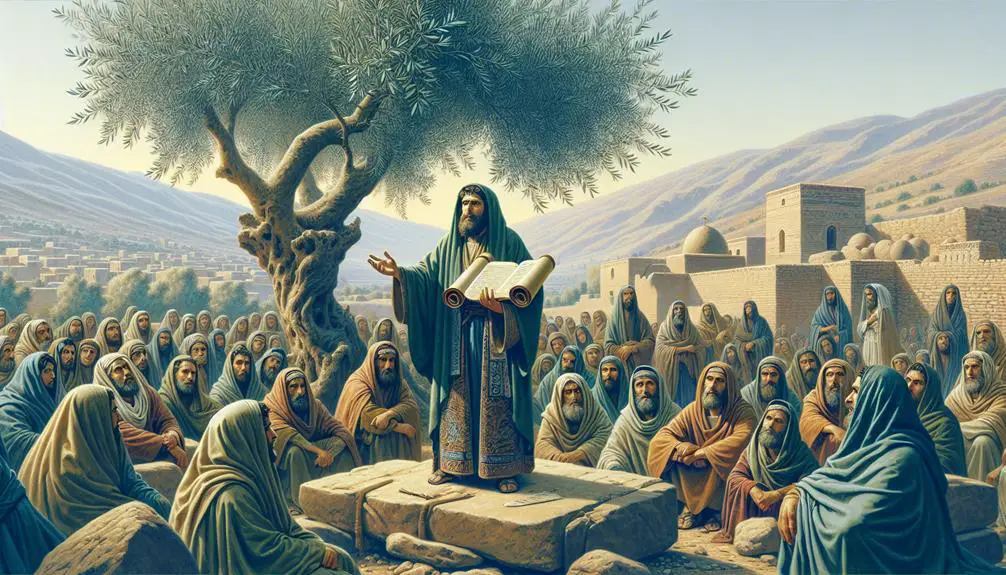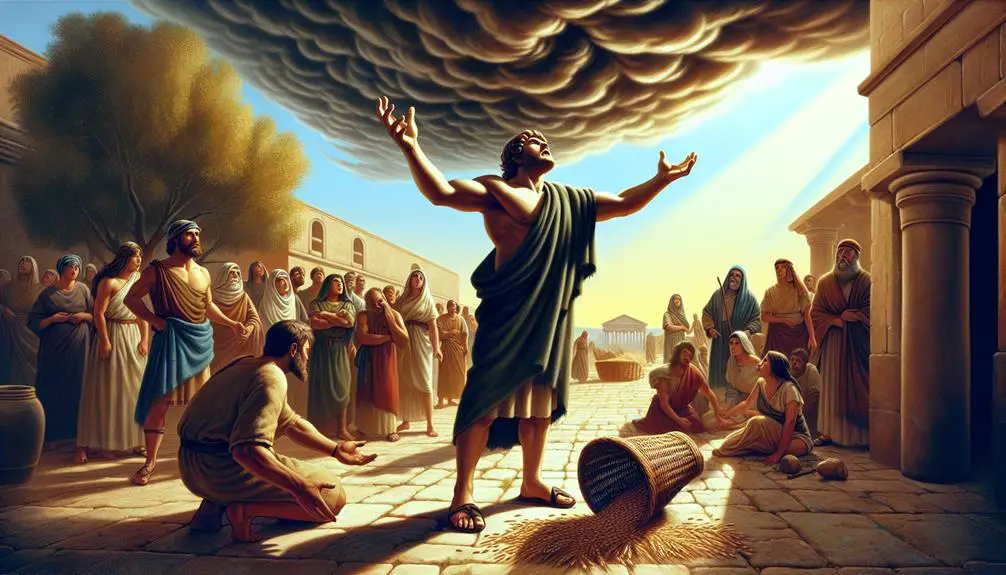Peer into the life of Agabus, an early Christian prophet whose predictions left a lasting legacy, and discover the mysteries that surround him.

Agabus in the Bible
Imagine walking through the bustling streets of the early Christian communities, where whispers of a prophet named Agabus echo among the believers. You've heard tales of his uncanny gift of prophecy, including foretelling a devastating famine and predicting Paul's imprisonment, which have woven him indelibly into the fabric of early Christian history.
As you ponder the significance of Agabus's role in the church, you can't help but wonder about the impact of his predictions and the legacy he left behind in Christianity. What lessons can you draw from his life that are still relevant today?
Key Takeaways
- Agabus was a prophet in the New Testament known for predicting a severe famine and Paul's imprisonment.
- His prophecies played a crucial role in mobilizing early Christian communities for relief efforts and supporting Paul.
- Agabus's accurate predictions affirmed God's active guidance and presence within the early Church.
- His legacy highlights the significance of prophecy in shaping the spiritual and communal dynamics of early Christianity.
Who Was Agabus?

Agabus stands as a prophetic figure in the Christian New Testament, known for his divinely inspired predictions concerning the early Church. His origin, while not extensively detailed in biblical texts, is suggested to be from the region of Judea, marking him as an early follower of Christianity with a profound spiritual gift. This positioning places Agabus within the heart of the nascent Church's development, offering him a unique vantage point from which to observe and prophesy its challenges and triumphs.
Agabus's prophetic accuracy is notably highlighted through two significant predictions. His first prophecy, documented in the Acts of the Apostles, foretold a severe famine that would devastate the entire Roman world. Historical accounts and subsequent events corroborate this prediction, validating Agabus's prophetic insight. His second prophecy involved forewarning the apostle Paul of his impending imprisonment should he proceed to Jerusalem. This prediction not only demonstrates Agabus's prophetic accuracy but also his willingness to deliver unwelcome news, underscoring the authenticity and seriousness with which he approached his prophetic calling.
In examining Agabus's origin and prophetic accuracy, you're drawn into a deeper understanding of his role within the early Church. His contributions, though briefly mentioned, underscore the pivotal role prophecy played in guiding and shaping the early Christian community. Agabus's accurate forecasts, rooted in divine inspiration, not only validated his prophetic gift but also served to strengthen the faith of the early believers, affirming God's active presence and guidance in their midst.
The Gift of Prophecy

Understanding the gift of prophecy requires us to delve into its significance within the early Christian context, where it served not only as a means of divine communication but also as a foundational element in the establishment and guidance of the early Church. This gift wasn't merely about foretelling future events but also involved speaking truth to power, offering correction, and edifying the community in accordance with God's will.
The gift of prophecy holds a unique place in Christian theology and practice, characterized by:
- Prophetic accuracy: A genuine prophecy aligns with God's truth and often comes to pass as a testament to its divine origin. This aspect is crucial for distinguishing true prophets from false ones, thereby preserving the integrity of the Church's message and mission.
- Ethical implications: The ethical dimension of prophecy can't be overstated. Prophets were often tasked with delivering messages that called for repentance, social justice, and adherence to God's commandments. Their role was inherently linked to the moral and spiritual health of the community.
- Communal edification: Prophecy served to strengthen, encourage, and comfort the early Christian communities. It played a pivotal role in their development, unity, and perseverance in the face of persecution and internal challenges.
Analyzing the gift of prophecy reveals its complexity and the significant responsibility borne by those who were entrusted with it. The balance between prophetic accuracy and the ethical implications of their messages underscores the profound impact this gift had on the early Church's formation, guidance, and sustenance.
Foretelling the Famine

Reflecting on the gift of prophecy's significance within the early Christian community, we now explore a notable instance where this divine communication profoundly impacted the Church: the foretelling of a widespread famine. This event, delivered through the prophet Agabus, stands as a testament to the historical accuracy and the practical implications of prophecies in the nascent Church. Agabus, emerging from the Judean landscape, journeyed to Antioch to deliver a prophecy of an impending famine that would grip the entire Roman world under the reign of Claudius Caesar.
This prediction, steeped in divine foreknowledge, wasn't merely for spectacle or awe. It served a functional purpose, mobilizing the early Christian community towards a collective action for famine relief. This proactive approach underscored the Church's commitment to the well-being of its members and the broader society, transcending mere spiritual edification to encompass physical aid and sustenance. The historical records of the time, including those by secular historians, corroborate the occurrence of this famine, lending credence to the prophecy's accuracy and the biblical narrative's reliability.
The Church's response to Agabus's prophecy is particularly noteworthy. Rather than succumbing to fear or passivity, the Christian community in Antioch initiated a relief effort, demonstrating an early instance of organized Christian charity. They set aside resources, according to each one's ability, to send aid to the brethren dwelling in Judea, thereby setting a precedent for Christian response to humanitarian crises.
This episode encapsulates the essence of prophecy within Christianity—not merely predictive, but directive, guiding believers towards compassion, unity, and actionable faith in the face of adversity.
Predicting Paul's Imprisonment

In another profound display of prophetic insight, the prophet Agabus forewarned of Paul's impending imprisonment, a revelation that further exemplifies the intricate role of prophecy within the early Christian community. This incident, as recounted in the Acts of the Apostles, underscores the tension between divine foreknowledge and human agency, particularly in the context of Roman Response and Travel Decisions.
Agabus's prediction didn't merely serve as a cautionary tale; it was a pivotal moment that tested the resolve of Paul and the early Christians. The prophecy highlighted several critical aspects:
- Roman Response: Agabus's prophecy underscored the inevitable clash between Paul's missionary activities and the Roman authorities. This anticipated conflict with Roman law and its executors wasn't just a matter of legal concern but also a significant theological challenge for the early church, navigating the complex interplay between earthly authorities and divine mandate.
- Travel Decisions: The prophecy directly influenced Paul's travel decisions, showcasing a profound devotion to his mission despite the forewarned dangers. Paul's response to Agabus's prophecy reveals the early Christian ethos of faithfulness and courage, even in the face of severe trials.
- Community Reaction: The early Christian community's reaction to Agabus's prophecy reflects a nuanced understanding of prophecy's role in their lives. Rather than dissuading Paul from his mission, they rallied around him, offering support and solidarity, thus reinforcing the communal bonds within the nascent Christian movement.
Agabus's prophecy of Paul's imprisonment not only foretold a significant event in the nascent Christian community but also provided a lens through which to view the dynamics of divine prophecy, human choice, and collective response within the early church.
Agabus's Role in the Church

Agabus's contributions to the early Christian church extend beyond his prophetic revelations, serving as a pivotal figure in shaping the spiritual and communal dynamics of the time. His presence and actions offer a fascinating insight into the mechanisms of prophetic validation and historical accuracy within the nascent Christian community. Agabus's role wasn't merely that of a foreteller but also of a validator of the burgeoning faith, providing tangible connections between the teachings of Jesus and the unfolding events of the early church.
His prophecies, deeply rooted in the Judeo-Christian tradition, underscored the continuity of God's interaction with His people, bridging the Old and New Testaments. This not only bolstered the faith of the early Christians but also provided a framework within which they could understand and interpret their trials and tribulations. Agabus's accurate predictions, particularly regarding the famine and Paul's imprisonment, served as a testament to his divine inspiration, reinforcing the credibility of the prophetic ministry within the church.
Moreover, Agabus's role was integral in fostering a sense of unity and purpose among the early Christians. His prophecies prompted tangible acts of solidarity and support, as seen when the church prepared for the famine he predicted. This response highlights how prophetic messages catalyzed communal action, binding the members closer together in preparation for shared challenges.
In essence, Agabus's influence went beyond mere prediction, embedding itself in the very fabric of early Christian identity and practice. His ability to accurately foretell future events provided prophetic validation that was essential for the historical accuracy of the Christian narrative, thereby affirming the fledgling faith's legitimacy and resilience in the face of adversity.
The Impact of Agabus's Predictions

The predictions made by Agabus had profound implications on both the spiritual mentality and practical actions of the early Christian community. His prophetic utterances, notably about a severe famine and the Apostle Paul's imprisonment, weren't just seen as isolated warnings but were deeply intertwined with how the early Christians viewed their relationship with God and their responsibilities towards each other. This intertwining showcased a remarkable blend of spiritual foresight and practical response that underlined the importance of prophecy in the nascent church.
- Historical accuracy: Agabus's predictions, particularly regarding the famine during the reign of Claudius, have been scrutinized for their historical accuracy. This aspect hasn't only validated the prophetic gift within a Christian context but also provided a tangible link to real-world events, enhancing the cultural significance of the biblical narratives.
- Cultural significance: The reactions to Agabus's prophecies reflected and shaped the cultural norms within the early Christian community. His predictions led to concrete actions, such as the collection of relief for the brethren living in Judea, demonstrating a culture of mutual aid and solidarity that was revolutionary at the time.
- Spiritual and practical synthesis: The early Christians' response to Agabus's prophecies exemplified a model where spiritual beliefs directly informed practical decisions. This synthesis laid foundational principles for Christian communal life, emphasizing the role of spiritual insight in guiding practical communal and individual actions.
Analyzing the impact of Agabus's predictions reveals a multifaceted influence on the early Christian community, intertwining historical validation with cultural and practical implications.
Legacy of Agabus in Christianity

You'll find that Agabus' legacy within Christianity extends far beyond his immediate actions relayed in the scriptures. His prophetic contributions significantly shaped the early Church's response to impending crises, while his influence persists in modern interpretations and insights into prophetic ministry.
This examination reveals the depth of Agabus' impact, illustrating how his foresight and spiritual guidance have been valued across centuries.
Agabus' Prophetic Contributions
Often, Agabus is remembered for his distinct prophetic contributions that have profoundly influenced Christianity's understanding of divine communication and forewarning. His narrative showcases:
- Prophetic accuracy: Agabus' predictions, notably the famine during Claudius' reign and Paul's arrest in Jerusalem, underscore his precise foresight. This accuracy not only validated his role as a prophet but also emphasized the reliability of divine messages.
- Interpretation methods: His symbolic acts, like binding his own feet and hands, illustrate the early Christian prophets' method of conveying God's messages through vivid, memorable actions.
- Spiritual discernment: Agabus exemplified the ability to discern and communicate God's will, a cornerstone for prophetic ministry in the nascent church.
His legacy underscores the integral role of prophecy in guiding and shaping the early Christian community.
Influence on Early Church
As Agabus' prophecies reverberated through the early Christian community, his profound influence on its development and understanding of divine guidance became unmistakably clear. His apostolic interactions, particularly with figures such as Paul, underscored the significant role prophets held in early Christian dynamics. These interactions weren't mere exchanges; they were foundational in shaping the theological and practical frameworks of the time.
Community responses to Agabus' prophecies further illustrate the weight his words carried. His foretelling of a severe famine led to preemptive aid measures, demonstrating the tangible impact of prophetic insight on communal actions. This integration of prophecy into community life underscored a broader theological acknowledgment of divine interaction within the early Church, cementing Agabus' legacy in the fabric of Christian tradition.
Modern Interpretations and Insights
Having explored Agabus' profound influence on the early Christian community, we now turn our attention to how his legacy continues to shape modern Christian thought and interpretation. Agabus stands as a testament to the importance of prophetic accuracy and cultural relevance in understanding biblical texts. His role in the New Testament highlights several critical insights:
- Prophetic Accuracy: Agabus' precise predictions serve as a benchmark for evaluating prophetic claims, emphasizing the need for discernment in contemporary Christian practice.
- Cultural Relevance: His actions demonstrate the significance of contextualizing biblical teachings within current societal frameworks.
- Guidance in Faith: Agabus' life encourages believers to seek spiritual guidance, particularly in interpreting divine messages relevant to today's challenges.
These aspects underscore the enduring relevance of Agabus' ministry in fostering a deeper, more nuanced engagement with scripture.
Frequently Asked Questions
How Did Early Christians Discern the Authenticity of Agabus's Prophecies Compared to False Prophets of the Time?
To discern the authenticity of prophecies, early Christians used specific prophetic criteria and closely observed the community's response.
They compared the prophecies against known teachings, looking for consistency with their foundational beliefs. A true prophet's predictions would align with these criteria, fostering a positive community response.
In contrast, false prophecies often led to confusion or division, alerting believers to question their validity. This process ensured they followed genuine spiritual guidance.
Are There Any Known Descendants or Family Lineage of Agabus That Continued His Prophetic Legacy?
You're diving into genealogical research, aiming for historical accuracy. Yet, when you search for descendants or family lineage that might've continued a specific prophetic legacy, you hit a wall.
There's no solid record or evidence pointing to known descendants or an ongoing family line of prophecy. This lack of information makes it challenging to trace or confirm any continuation of such a unique legacy through generations.
Has Modern Archaeological or Historical Research Uncovered Any Additional Information About Agabus Not Mentioned in the Bible?
You might wonder if modern research has shed new light on Agabus. Despite the advances in archaeological methods and a commitment to historical accuracy, there's yet to be any significant discovery regarding Agabus outside the biblical narrative.
This lack of additional information means our understanding of him remains largely framed by ancient texts. As such, any continuation of his legacy or further insights into his life remain undiscovered through contemporary archaeological efforts.
How Has Agabus's Approach to Prophecy Influenced the Practices or Teachings of Modern Prophetic Movements Within Christianity?
How does one influence modern movements without historical evidence?
Agabus's model of prophetic accuracy and charismatic leadership has deeply impacted contemporary prophetic movements within Christianity.
His approach, blending sharp insight with compelling leadership, serves as a blueprint for today's prophets.
They strive for accuracy in their prophecies, emulating his method to enhance their credibility and influence.
This legacy shapes the teachings and practices of modern prophetic movements, ensuring their relevance and resonance.
In What Ways Have Non-Christian Historians or Religious Scholars Interpreted the Figure of Agabus and His Prophecies?
You'll find that non-Christian historians and religious scholars often view Agabus through a lens of historical skepticism. They analyze his prophecies and cultural impact critically, questioning the historical accuracy and intent behind his predictions.
Their interpretations diverge from faith-based perspectives, focusing instead on the historical and cultural contexts that might've influenced Agabus's actions. This analytical approach sheds light on how different belief systems perceive prophetic figures outside their own religious traditions.
Conclusion
In conclusion, Agabus stands as a pivotal figure in early Christianity, embodying the profound capacity for divine prophecy. His accurate forewarnings, from the famine to Paul's imprisonment, underscored the critical role of prophecy in guiding and shaping the nascent church.
Agabus's legacy, akin to an ancient weather app predicting storms of trials and tribulations, remains a testament to the enduring influence of spiritual gifts in faith communities. Through his story, the intricate tapestry of early Christian history gains depth and vibrancy.



Sign up